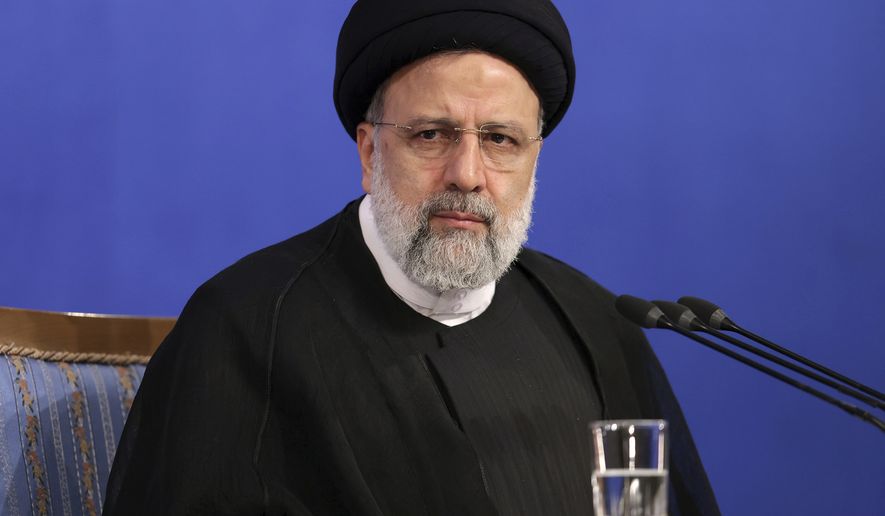More than 500 Iranian-American scientists, scholars and industry executives are urging the White House to deny Iranian President Ebrahim Raisi entry into the U.S. for the United Nations General Assembly in New York later this month.
In a letter to President Biden on Thursday, the group called for “strong and immediate actions to reflect that Raisi does not represent the people of Iran and therefore must be denied an entry visa to the United States.”
“For over a century, the people of Iran have struggled for freedom from the tyranny of the Shah and the mullahs currently ruling in Iran,” said the signatories, led by the Iranian Professionals’ Ad Hoc Committee on Iran Policy. “We ask that you stand with the people of Iran in their demands for peace, freedom and a non-nuclear, secular Republic of Iran.”
The letter adds to growing calls by Iranian opposition groups in the U.S. and lawmakers on both sides of the aisle to ban the hard-line cleric who remains under U.S. sanctions for human rights abuses from stepping foot on American soil.
The Organization of Iranian American Communities (OIAC), a group allied with the Iranian dissident group the Mujahedin-e-Khalq, or MEK, lined the National Mall last month with thousands of photos of Iranians who were killed during the 1988 executions of political prisoners.
Those death sentences were ordered by Iranian Supreme Leader Ayatollah Ruhollah Khomeini and carried out by a three-judge panel on which they say Mr. Raisi served.
The group says Mr. Raisi, who was elected as Iran’s president last year, played a direct role in the 1988 mass executions of 30,000 political prisoners and the deaths of more than 1,500 protesters during the 2019 uprising in Iran.
Mr. Raisi has denied any role in sentencing political prisoners to death during the mass executions in the 1980s.
Human rights groups and current and former U.N. officials have called for an official investigation into Mr. Raisi’s role in the killings.
In 2019, the Trump administration sanctioned Mr. Raisi, who was then the head of Iran’s judiciary, for his role in approving the execution of multiple minors between 2018 and 2019, despite human-rights treaties which Iran has signed that prohibit the death penalty for people under the age of 18.
The Treasury Department pointed out that, at the time, there were more than 90 children on death row.
Several other lawmakers also began raising the alarm last month after Iran confirmed Mr. Raisi’s intent to travel to New York.
In a letter to Mr. Biden, seven senators called for Mr. Biden to deny Mr. Raisi’s visa request, citing also Iran’s Islamic Revolutionary Guard Corps plot to assassinate current and former senior U.S. officials.
“Raisi’s involvement in mass murder and the Iranian regime’s campaign to assassinate U.S. officials on American soil make allowing Raisi and his henchmen to enter our country an inexcusable threat to national security,” the lawmakers wrote.
The letter was signed by Republican Sens. Tom Cotton of Arkansas, Rick Scott and Marco Rubio of Florida, Chuck Grassley and Joni Ernst of Iowa, Marsha Blackburn of Tennessee and Ted Cruz of Texas.
The lawmakers said granting Mr. Raisi’s visa would “legitimize his repression,” adding that “it is a risk we cannot and should not take.”
The move to deny a world leader’s attendance at the U.N. summit, while not unprecedented, would undoubtedly spark a diplomatic firestorm and further complicate already fraught relations between Washington and Tehran amid the Biden administration’s push to re-enter the Obama-era nuclear deal with Iran.
In their letter Thursday, the Ad Hoc Committee on Iran Policy also urged Mr. Biden to use his address to “highlight the views reflected by a large bi-partisan voice in U.S. Congress, U.N. experts, and the Amnesty International, and above all by the people of Iran that Ebrahim Raisi should stand trial before international tribunals for crimes against humanity and genocide.”
More than 100 world leaders will gather for the 77th session assembly, which opens next week.
Mr. Biden is expected to address the body on Sept. 20.
• Joseph Clark can be reached at jclark@washingtontimes.com.




Please read our comment policy before commenting.